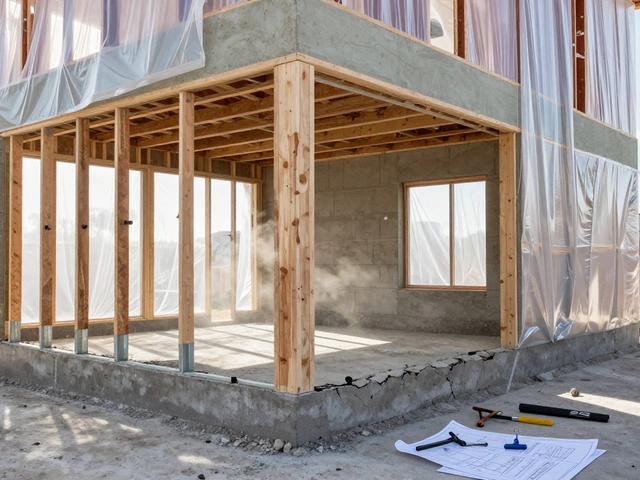So, you're planning a construction project and need to decide whether to hire a contractor or a construction company. It's a pretty big decision and can have a huge impact on your project's timeline, budget, and outcome.
Let's break it down. A contractor is usually an individual or a small team skilled in a specific trade like electrical work, plumbing, or carpentry. They're hired to handle specific tasks in a project, like wiring a new house or installing plumbing systems.
On the other hand, a construction company is like a one-stop shop for your building needs. They typically provide a range of services, from project planning and management to executing the construction itself. This could include everything from earthmoving to finishing touches, often with a team that covers all necessary trades.
Knowing these differences can help you make the right choice for your needs. For straightforward, specific jobs, a contractor could be the more affordable and practical option. Meanwhile, for larger, more complex projects, a construction company might provide the cohesive management and resources you need to see it through from start to finish.
- Defining Contractors and Construction Companies
- Roles and Responsibilities
- Choosing the Right One for Your Project
- Key Differences and Benefits
Defining Contractors and Construction Companies
When embarking on a building project, understanding the roles of a contractor and a construction company is crucial. Though they might seem interchangeable, they're not quite the same.
What Exactly is a Contractor?
A contractor is typically an individual or a small business specializing in a specific part of a construction project. They might focus on tasks like electrical systems, plumbing, or framing. They often work on multiple projects, moving from one site to another, as they're hired for particular expertise needed at certain stages of construction.
Understanding Construction Companies
In contrast, a construction company usually offers a comprehensive range of services. They're often larger organizations that handle a project from start to finish, managing all the intertwining tasks that form a successful construction project. This includes planning, permitting, execution, and often even finishing touches like landscaping.
"The difference between a contractor and a construction company is like comparing puzzle pieces to the entire puzzle itself," says John Baxter, a well-respected industry expert in construction project management. "Contractors are invaluable for their specialized skills, while construction companies offer the big picture management that's essential for larger projects."
Specialization vs. Comprehensive Service
This leads to the primary distinction: specialization versus comprehensive service. Contractors are valuable when you need expertise in niche areas, whereas construction companies provide a full package, often including all the specialized trades under one roof. They manage subcontractors and vendors, which simplifies the complex coordination involved in bigger builds.
A useful stat: according to a recent construction industry survey, about 65% of new residential builds are handled by construction companies compared to approximately 35% by individual contractors.
Keep these distinctions in mind as they can significantly influence your project's flow, budget, and overall success. Knowing whether you need a contractor or a construction company can make all the difference in how smoothly your project progresses.
Roles and Responsibilities
When it comes to understanding who-does-what in a construction project, knowing the roles and responsibilities of a contractor versus a construction company is key. These responsibilities determine how work is done, timelines are met, and budgets are managed.
Contractors
Contractors are specialists. They're hired for specific tasks based on their expertise. For example, a contractor might focus solely on electrical work, bringing detailed know-how to your project. Their primary responsibilities include:
- Delivering precise work within their trade.
- Procuring necessary materials and tools for their tasks.
- Adhering to safety standards and regulations specific to their field.
Importantly, contractors usually work on a project-by-project basis. They jump in, deliver their part, then move on to the next gig. This offers flexibility but might mean juggling schedules for large projects.
Construction Companies
Construction companies are like the Swiss Army knife of the building world. They cover the whole spectrum, managing every aspect of a project. Here’s where their responsibilities lie:
- Overall project management, including planning and scheduling.
- Coordinating between different trades and workers.
- Ensuring all necessary permits and inspections are handled.
- Implementing safety protocols across the project site.
Acting as the general manager of sorts, a construction company takes a top-down view to ensure everything goes smoothly. This level of involvement is ideal for bigger projects, providing seamless integration from start to finish.
Differences in Approach
While contractors laser-focus on specific tasks, construction companies offer a more holistic approach. Choosing between the two often depends on the project's scale and complexity. For small, straightforward tasks, a skilled contractor might be all you need. But for elaborate builds with tight deadlines, the organizational power of a construction company could be your best bet.

Choosing the Right One for Your Project
Deciding between a contractor and a construction company depends a lot on the specifics of your project. It's not a one-size-fits-all decision, so let's walk through some key considerations to guide your choice.
Size and Scope of the Project
If you're dealing with a major renovation or building from the ground up, hiring a construction company might make more sense. They typically have the resources and manpower to handle large-scale projects efficiently. On the flip side, for smaller or more specific tasks, like kitchen remodels or installing new windows, a specialized contractor could be more suitable and cost-effective.
Budget and Cost
Budget plays a critical role. Generally, hiring a construction company means you're paying for the full package of services, which can be pricier upfront. However, they often provide comprehensive project management that can save on unforeseen costs down the line. Contractors usually bill for specific tasks, which might align better with modest budgets.
Expertise Required
Think about the expertise you need. Contractors are often highly skilled in their specialty fields like plumbing, electrical work, or tiling. This can lead to high-quality results in their domain. Meanwhile, a construction company covers a wider range of services and coordinates all the necessary trades, offering a seamless experience through different stages of the project.
Timeline and Scheduling
Another factor is how quickly you need the project done. Construction companies often have larger teams and can push through tight schedules, reducing overall project time. Contractors, being smaller operations, might have more flexibility in fitting your job around other commitments, although this could lead to longer wait times if they're juggling multiple clients.
Take a step back and evaluate your priorities: budget, timeline, complexity, and the level of expertise needed. Making an informed choice here can set the tone for your entire construction project, ensuring a smooth process and a satisfying end result.
Key Differences and Benefits
With contractors and construction companies, the differences can be quite significant, impacting how projects are executed. Let's dive into some of these nuances and see where they might benefit you.
Individual vs. Team-Based Approach
One of the first things you'll notice is the difference in size and structure. Contractors are usually solo operators or small teams focused on specific tasks. They're the go-to for specialized jobs like electrical or plumbing needs, meaning you get someone who excels in that particular area.
On the flip side, a construction company is more like an all-in-one solution, often employing a range of specialists to tackle every aspect of a project. They manage everything from planning to execution, offering a seamless approach for larger, more complex projects.
Flexibility and Specialization
Contractors often bring flexibility. Since they're focused on specific tasks, they can adapt quickly to changes in their area of expertise. Need a sudden tweak in your plumbing setup? A contractor can likely handle that with little fuss.
In contrast, the holistic approach of a construction company delivers consistency and comprehensive oversight. With a broad range of skills under one roof, they can cover any situation without needing to outsource or delay.
Cost Considerations
Costs can be a huge factor. Contractors may be more cost-effective for specific tasks or smaller projects since you're paying for the job at hand rather than the overhead of a full company.
However, for bigger builds, a construction company might offer more value by bundling services, reducing the hassle of coordinating multiple contractors, and possibly optimizing materials and labor costs.
Quality Assurance and Accountability
With a construction company, the accountability factor is often more pronounced. They have built reputations on delivering projects from start to finish, which means maintaining quality standards throughout.
Contractors, though highly skilled, might focus solely on their part of the job. This specialization, however, ensures that you’re getting top-notch quality in their particular field.
Making the decision between a contractor and a construction company ultimately depends on the scope of your project, your budget, and your need for specialization versus comprehensive management. Weighing these key differences and benefits carefully will guide you to the right choice for smooth sailing on your building journey.








